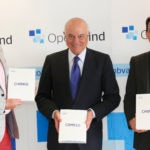Francisco González: Banks have to develop a new business model that adapts to the digital world and is based on knowledge
Francisco González, the president of BBVA, presented the book “Ch@nge in Madrid. 19 fundamental essays on how the Internet is changing our lives", along with Federico Casalegno, director of MIT Mobile Experience Lab (USA) and Lucien Engelen, director of Regional Acute Healthcare Network, of the Radboud University Medical Centre (Holland), two of the book's authors.

This book, which compiles the views of distinguished specialists from various fields of knowledge, is the sixth volume of a collection published by BBVA that explores the key issues of our age.
During the presentation, the president of BBVA highlighted the importance of OpenMind, a digital knowledge community concerned with science, technology, economy, the environment and humanities and explained that the choice of the Internet as the subject of the new book was its role as the major agent for change in our age. "It has a crucial effect on all human activity, in all the spheres of our life, whether we realize it or not". He also added that "Society has changed: people are becoming increasingly informed and more demanding, while their consumption habits, preferences and decision making criteria are changing.
And, although banks and finances have evolved, they have done so at a much slower rate than other sectors. "However, the great tsunami of changes, and the profound reconversion of the banking sector is inevitable and very close at hand", warned Francisco González. In his opinion, the financial industry is entering unknown territory: "The traditional financial industry is becoming what I call the BIT (banking, information and technology) industry, a stepping stone towards real knowledge banking; an industry capable of providing more and better solutions for people's lives, thus boosting economic growth and welfare at a truly global level".
This represents a threat to current banking institutions, admitted the president of BBVA. "Nonetheless, from the point of view of individuals, consumers and society as a whole, it should be seen as a great opportunity. A more competitive, more flexible, more efficient and more convenient financial system for all".
Up to now, many thought that the Internet giants, such as Google, Apple, Facebook or Amazon would not make an all-out effort to enter into a business such as banking, which is highly regulated and whose market value is much lower than their current business. "All these large companies are still in a trial and error phase, but some of the ones I have mentioned - and others that we have probably not yet heard of - will end up launching much more ambitious initiatives", ensured Francisco González.
The president of BBVA considers that banks have a highly significant competitive advantage versus these new competitors: the great volume of information they have on their customers. "The great challenge is to turn these data into information and the information, in turn, into knowledge. And to use that knowledge to offer customers what they want, when and how they want it".
To meet these demands, banks have to develop a new business model that adapts to the online world and is based on knowledge. "At BBVA, we want to be prepared for the change brought on by this technological revolution, which is largely centered on the Internet. Of course we are not prophets and do not know exactly how the world, people, our industry or even BBVA will be like some years from now. But we do know that knowledge is the key for a better future, for BBVA, for people and for society", concluded Francisco González.

Federico Casalegno focused his intervention on the risk that the symbiotic relationship between individuals, networks and technologies will disconnect us from direct human interaction. The goal of the Mobile Experience Lab managed by Casalegno in the MIT is precisely to design new means and technologies that connect individuals, places and information, but always from an anthropocentric viewpoint, where technology is a tool and not the engine of innovation.
In his opinion, "Digital technology has reinvented our expectations of staying connected at the expense of giving up some of our most important human connections, those that take place face to face". As our devices become increasingly complex - warned Casalegno - it becomes more necessary to carefully consider how we can benefit from digital technology without turning into cyborgs.
Lucien Engelen focused on the effects of new technologies on healthcare, which has caused certain aspects of healthcare assistance to take steps toward extinction. However, Engelen is convinced that we will continue to need medical professionals, real people with real empathy, to provide quality care.
In the future - predicted Engelen -, being a good healthcare professional will not be enough because medical treatment will become an experience and patient satisfaction with the service provided may be just as important as the quality of the medical treatment. In addition, patients are better informed and want to assume control of their health.